How the Syrian crisis came home to small-town Canada
She picks up underwear for her nephews and then wanders into the men’s section. Her cheeks turn pink. “There are pictures,” she says of the Fruit of the Loom packages. “I am too shy.”
She comes from a conservative Islamic world, one of modesty. Buying briefs for her brothers proves too embarrassing. She looks at clothing for her mother and sister. “I don’t even know what they like anymore or what size to buy.”
When Muna said goodbye to everyone she loved in Syria in 2010, it was not meant to be for long. But as the uprising against Bashar al-Assad turned violent and civil war engulfed her homeland, months turned into years. Six long years.
The past few have been the hardest. Her loved ones were forced to flee the fighting and take refuge in other countries: Lebanon, Germany, Turkey, Sweden. They were a close-knit family suddenly splintered by war, unsure whether they would ever be reunited.
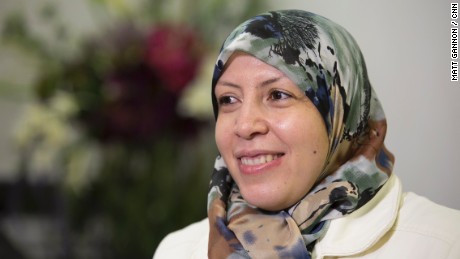
At 32, Muna never imagined she would not see again her childhood home in Damascus, the backyard lined with walnut, lemon and olive trees and fragranced by sweet jasmine. It was so close to the Canadian Embassy that Muna could see the red and white maple leaf flag flutter in the wind as she waited for the bus every day.
It seemed improbable in her youth that Canada would be her new home. She knew only what the country’s flag looked like and that winters were polar bear cold.
When she arrived in Lethbridge six years ago, it felt every bit as alien as it was distant.
On this afternoon in late January, Muna is the only woman in the store with her head covered. She has slowly adjusted to being different in Lethbridge, a small southwestern Alberta city that is not at all cosmopolitan like Toronto, where it’s possible to hear a dozen languages on the subway. Muna didn’t even register in the most recent Canadian census of immigrants in Lethbridge. The column for Syria says 0.
But it is safe here, and Muna has been trying feverishly for years to bring over her parents and siblings who belong to the terrible club of nearly 5 million refugees created by the Syrian conflict.
Muna’s myriad pleas for help had gone nowhere — until one fateful day last fall.
Because of a mood swing in her adopted country and a chance meeting with a Christian man, Muna’s life is about to change.
By year’s end, Lethbridge’s Syrian population is expected to rise to 300 or more. Muna is hoping that number will include several members of her own family.
MUST WATCH
She pays for her things at Walmart and walks toward her electric blue Honda Fit. The Chinook winds gusting off the Canadian Rockies are foreboding this afternoon, at hurricane force. Muna’s mind is spinning even faster.
What if there is a last-minute glitch with paperwork? What if her parents and her brothers lose what might be their last chance at freedom?
She keeps her phone by her side, just in case her brother calls and also because it contains her most precious possession: family photographs. She is almost afraid to look at them. One is a close-up of her father wearing a navy knit cap.
She stares at his face, grainy and yet so clear. He looks old and tired to her, but not because of his age.
She also stores a video that a sister in Germany compiled with images of everyone in happier times. It’s set to an Arabic song that roughly translates as “I miss my mother’s smile.” Muna has only been able to watch it three times, even though she has had it for months, and every time, tears well in her eyes.
“Mama!” says Mohammed to his mother. He has seen her cry like this so many times.
Muna has a large family — eight siblings — and she realizes it will not be possible to bring them all here at once. When she told them this harsh truth, her brothers and sisters had the same reaction: “Leave me here. Take the others.”
These are the kind of choices that must be made when there is nothing but despair all around. Each wished for the other a better future.
Muna knows it will be toughest of all for her mother. A journey to Canada means leaving behind a son who has not been heard from since he was detained in Damascus. It will be hard to get her mother to the Beirut airport.
Muna pinches herself to make sure she’s not dreaming. It doesn’t feel real at times. She has pictured a reunion so many times in her head. She has so many questions. But first, she will hold onto her mother and father. And not let go.
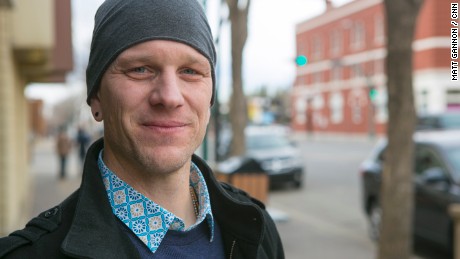
‘What if this were my family?’
For Ryan Dueck, Syria was just one of those faraway and troubled Mideast nations that occasionally made the news. He didn’t take real notice until the war began producing horrific numbers: There were already 2 million refugees by the end of 2013; 1 million of them, children.
That bothered Ryan, a husband, father and pastor.
He is the son of a Mennonite farmer who grew hay, grain, peas and canola and raised hogs and cattle in the prairies that lie in the shadows of Alberta ski resorts. He instilled in Ryan a strong Christian conviction.
Ryan, 40, studied philosophy and theology and practiced as a Mennonite pastor in Vancouver before heading back home to Lethbridge almost five years ago with his wife, Naomi, and their adopted twins. Nicholas and Claire are Ojibway Indians; through them, Ryan learned for the first time what it means to be different. He saw his own kids feel the sting of racism.
He saw it, too, in the reactions of North Americans to the Syrian refugee crisis.
He understands concerns about terrorism; Canada has seen its share of plots and attacks. In 2006, authorities arrested 18 people who were inspired by al Qaeda and allegedly plotting to seize hostages and behead the Prime Minister. In 2014, a gunman’s attack on Parliament made Canadians think again about beefing up security measures.
Ryan was all for vetting refugees entering Canada, but he couldn’t understand how anyone, especially Christians, could oppose giving safe haven to people fleeing war. He winced when he saw Christians posting cartoons of a Trojan horse outside the gates of Europe with a sign that said “refugees” on the front and “ISIS” on the back. Jesus was not at all ambiguous about loving one’s neighbors — or one’s enemies, he believed. He liked to remind his fellow citizens of the parable of the Good Samaritan.
He saw the headlines about escalating violence in Syria and thought: “What if this were my family?”
In January 2015, Ryan and his parishioners at Lethbridge Mennonite Church decided they could no longer stand on the sidelines of the Syria conflict. The scale of what was happening there had become impossible to ignore.
Church members split into six groups and brainstormed ideas. What could they do to help? They knew that their actions would not make a dent in the crisis, but perhaps they could relieve the suffering of one family.
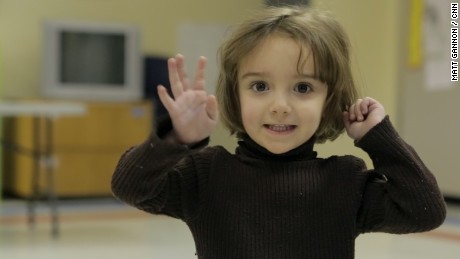
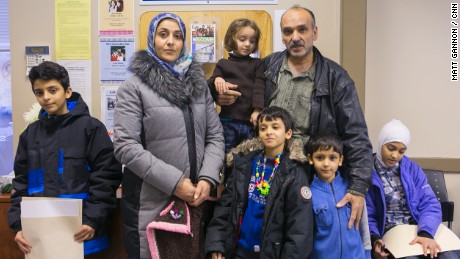
Ryan knew sponsoring refugees would be a huge undertaking. They would have to raise about $30,000 to support one family for a year. Beyond the financial backing, they would have to commit to helping the family settle in Lethbridge. That meant setting up a home, driving the newcomers around, taking them for medical checkups, getting the kids enrolled in school and the adults in English classes and other activities that make up the rhythm of life in Lethbridge.
Last spring, Ryan’s sponsorship group launched a Facebook page, “From Syria to Lethbridge,” to raise visibility of his group’s efforts. A Syrian Orthodox priest who came to speak at the church as part of a peace program knew two brothers, Feras and Fadel Aljaber, who had fled the besieged city of Homs with their families. They were in Lebanon, waiting for a new home. Suddenly, the church had their families.
Donations came in at a steady pace. Some gave thousands of dollars. Others wrote a check for whatever they could afford — $20, $50. The money increased exponentially after the global publication of a photograph of Alan Kurdi, the 3-year-old Syrian boy whose body washed ashore on a Mediterranean beach.
The photo moved Canadians to act and Ryan’s group became the focal point of goodwill in Lethbridge. Ryan recalls 40 people showing up at the next meeting.
The same kind of organizing was going on all over Canada, and the pace picked up significantly after the conservative government of Stephen Harper lost October’s parliamentary election to the Liberals. There were many reasons for the defeat, but one was certainly Harper’s hard line on accepting Syrian refugees and his opposition to the wearing of a niqab, or facial cover, by Muslim women at citizenship ceremonies.
Many Canadians, including Ryan, saw that as just plain mean.
New Prime Minister Justin Trudeau took office in early November. He intended to make good on a campaign promise to take in 25,000 government-sponsored Syrians by the end of February. Many more could come through private sponsors.
South of the border, the governors of 30 American states said they would not resettle Syrians after President Barack Obama announced plans to admit up to 10,000 refugees. Meanwhile, in Canada, things began moving forward at an extraordinary pace.
Canadian DNA
Lethbridge took the cue and oiled its refugee welcoming machine. The city formed a formal steering committee that included health workers, police officers, immigrant services staff, the mayor and private sponsors, like Ryan, who were growing by the day. One group was formed by local doctors; another was a university-led effort.
Mayor Chris Spearman says Lethbridge is the only city in Alberta that has been meeting with community groups on a weekly basis. He anticipates about 350 Syrians will settle in Lethbridge — more than 145 had arrived by the end of February. That’s a sizable population for a city that is small and without a significant Arab community.

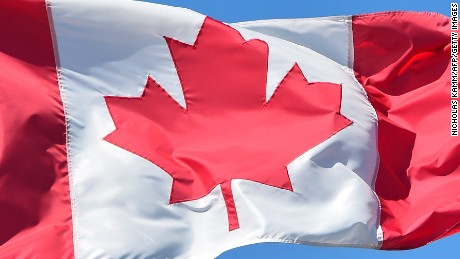
Everything you heard about the brutal winters is true. Bring long johns.
Canadians are generally pretty polite people, eh?
They take a lot of pride in not being “American.”
They obsess over hockey.
They eat a lot of poutine (French fries smothered in cheese curd and gravy). A LOT.
Everything is in English and French, even when you are not in Quebec.
There’s more to the national anthem than “Oh, Canada!”
Yes, Justin Bieber is Canadian. So is Celine Dion.
If America is a melting pot, Canada is a mosaic.
“These families escaping Syria are attacked by terrorists and are being attacked by their own government,” says Spearman, himself an immigrant from Britain. “The measure of a community is how it treats the people who have the least.”
Spearman often drives down to Sweet Grass, Montana, just an hour south of Lethbridge, to buy lottery tickets. He says he doesn’t understand why governors and mayors in America are so hesitant to welcome Syrian refugees. Their fears, he thinks, are “unfounded.”
Sarah Amies, director of Immigrant Services, knows the integration challenges will be plenty in Canada. A large number of the Syrians are arriving through the United Nations High Commissioner for Refugees and are the most vulnerable of a vulnerable population. Many were poor and uneducated before the war and are even more so now. And they have large families.
“We have at least three pregnant mums and lots of kids under the age of 5,” says Amies, overseeing a mass immunization organized by her agency.
But this is not the first time Canadians have stepped up for people in crisis, and community leaders are banking on experience. In 1979, the government announced it would take in 50,000 refugees from Vietnam, Laos and Cambodia or “boat people” as they came to be known. By the end of 1981, 60,000 such refugees were settled in Canada. Even back then, many were sponsored by private citizens.
Refugees can enter Canada one of three ways: they can be sponsored by the government or by a private group or receive a little support from both. Canada requires private sponsorships to consist of at least five individuals to ensure a yearlong commitment to the refugee family.
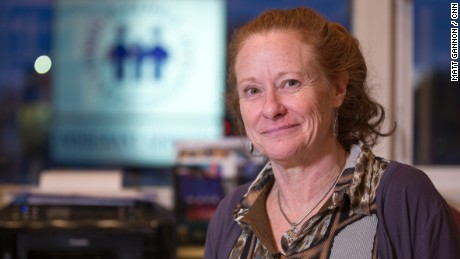
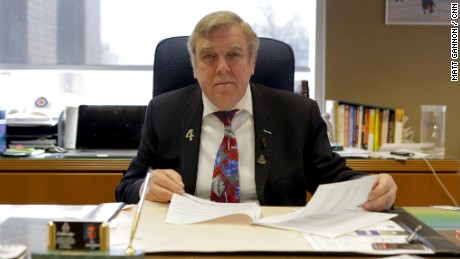
Private sponsorships were a big reason the U.N. High Commissioner for Refugees in 1989 awarded the people of Canada its Nansen Refugee Award, given for extraordinary service to the forcibly displaced. Recipients have included Doctors Without Borders and the late Sen. Edward Kennedy. Canada is the only country to have ever won.
Naomi Alboim, who spearheaded the Southeast Asian refugee effort for the government of Ontario, co-founded Lifeline Syria in June to help with the current crisis in the Toronto area. In Alboim’s mind, there is no question that Canada is doing far more per capita to help Syrians than any other country.
“Are we a gentler people? Yes, maybe. It’s almost in Canadian DNA,” Alboim says.
Certainly, there has been opposition to opening Canada’s borders. Canadian media have cited polls that show Canadians are divided on how many refugees to accept. There has also been backlash. Syrian refugees were pepper-sprayed at a January welcoming event in Vancouver, and in Calgary, just two hours from Lethbridge, graffiti sprayed at a school said: “Syrians go home and die” and “Kill the traitor Trudeau.”
But those incidents have been isolated and for the most part, Trudeau’s ambitious goal of resettling refugees has proceeded smoothly.
Trevor Harrison, a Lethbridge sociology professor who studies Canadian society, says his city represents the very best of what he views as quintessentially Canadian. If the United States is a melting pot, then Canada, he says, is a mosaic. By that he means Canada welcomes immigrants and embraces their “otherness” perhaps more than America. Multiculturalism has been policy here since the 1970s.
“Our sense about fear and the threat of being different,” he says, “isn’t the same as in the States.”
That’s what both Muna and Ryan are counting on.
‘Please, if you can help me fast’
A few weeks after Canadians first saw the photo of Alan Kurdi’s body, Muna stumbled upon the “Syria to Lethbridge” Facebook page. She copied and pasted her appeal, one that she could recite from memory by now, and hit the return key to send.
“Hello, I am Muna Ali from Lethbridge. I have been living here 6 years. I am from Syria and I have family members there and in Lebanon. I’m wondering if you help bring Syrian refugees. I have gone to many places to seek help but nobody could do anything for me. … Please if you can help me fast that will be very appreciated because my brother is planning to go to Europe in the famous dangerous way.”
Muna was shocked when she heard back right away. She and Ryan exchanged messages and on the first day of October, they agreed to meet.
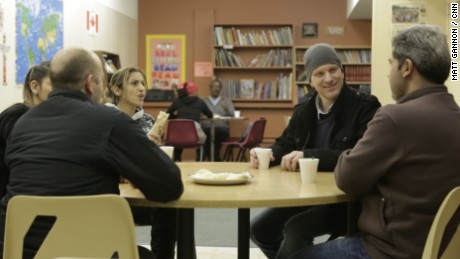
Ryan went to see Muna with Syria weighing heavy on his mind.
The day before, he’d read about the latest bombing in Homs, the Syrian city that was the cradle of the uprising, and texted the Orthodox priest he met to make sure he was alright.
Ryan sat on a tractor at his father’s farm, taking in the crisp fall air. He knew he would later go home and take his kids to volleyball and youth group at church. His Syrian friend, meanwhile, would be surrounded by the terrifying booms and blasts of war. He thought, too, about the Aljaber family his church was sponsoring. They were in a temporary shelter in Lebanon wondering: Where will we go? When will we be safe?
Now at the cafeteria of the University of Lethbridge, Ryan was about to meet another desperate Syrian.
Muna came with her son, Mohammed. Muna was not accustomed to being alone in the presence of an unknown man. That was new to Ryan. He’d never been exposed to Muslim culture in southwestern Alberta.
She told him her story. She had a degree in business administration and was a teacher at a middle school in Damascus. She and her husband, Hasan, a native of Iraq, met online, married and shortly after their son was born in Syria, Muna boarded a plane to Lethbridge. Years earlier, Hasan had escaped war in Iraq and settled here, earning a living as a truck driver.
Muna said her son does not know his grandparents or his uncles and aunts. Mohammed came home from a pizza party at school once and asked his mother: “How come my friends’ grandparents come to the party but mine don’t?”
As Muna spoke, Ryan looked at the university students coming in and out, talking and laughing. They reminded him of his younger self when he was enrolled here. Now, the mundane seemed maddening.
In that and subsequent conversations, Muna’s sorrows came gushing out. She told Ryan about how her father sold his farm after the war ignited. He knew that peace would not come to Syria for a long time, maybe even 50 years. The whole family understood that things would never be the same.
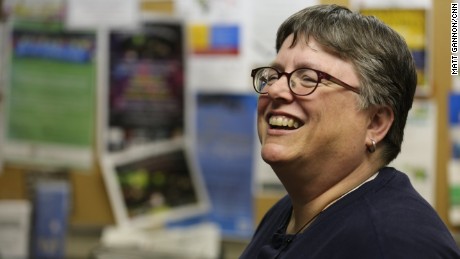
One brother was arrested by men who shoved him into a white van in downtown Damascus. He has not been seen since. Her brother-in-law also went “missing.” Two other brothers escaped conscription into Assad’s army by fleeing to Lebanon, then to Qatar, Sudan and Libya, where they were able to get on a migrant boat to Italy. From there, they managed to cross Europe and made it to Sweden. Yet another brother is in Turkey, and a sister made it to Germany. Left in Lebanon was the part of the family Muna was trying to bring to Canada: two more brothers, Abdul and Osama, her sister, Waffa, whose husband is missing, and her parents, Hassan and Thiba, who fled Syria in 2013.
Muna described the uncertainty that war brings; how she lies down at night not knowing whether her brothers and sisters are still breathing. She has sometimes been so consumed with worry that she can’t work, study or sleep. It is all she can do to take care of her son.
Sometimes, she feels overcome by guilt. Why should she enjoy such a comfortable existence while her parents and siblings struggle? She thinks of her brothers when she eats baklava and other sweets made from rice and milk.
“Has it been hard?” Ryan asked about her life in Canada.
“Not really,” she replied. “The people are so nice here. You walk down the street, and people smile at you. We sit here, you and I, in a cafe, and nobody bothers us. If this was my country, people would be very suspicious.”
Muna told Ryan her family was considered illegal in Lebanon. As refugees, they could not renew their documents without returning to war-torn Syria, but they couldn’t continue living in Lebanon either.
“They can’t stay, but they have nowhere to go. The borders are all closed. Nobody wants them,” Muna said.
One brother tried to pay smugglers to take his family across the Mediterranean, even though he knew thousands had perished when their boats capsized in the deep waters. The smugglers took all her brother’s money but failed to secure passage.
They’ve lost their homes and their possessions, Muna told Ryan. To feed their families, her brothers work under the radar in Lebanon, doing odd jobs here and there.
“They are good workers, and they want to do anything,” she said. “It’s hard. Very hard.”
Ryan kept looking at Mohammed, wise beyond his 6 years. He had seen his mama cry too often and wanted so much to stop her tears. He tugged at his mother’s arm and spoke to her in Arabic: “Will this man help us?”
“Shhhh,” Muna said. She didn’t want to overwhelm Ryan.
In that moment, Ryan recalls, the abstractions of Syria vanished. He was looking at a woman scarred by the war.
He told Muna he would try to help, though the truth was he was brand new to the intricacies of the immigration process.
“I don’t know the words to say,” she said. “You are the first people to ever even listen to my story.”
No place to call home
A few weeks later, Ryan sat down with Muna at his church to finalize the application forms for her family. It took an hour and a half to go through the bureaucratic maze.
“What can I put here?” Muna asked, pointing to the “address” line.
Ryan knew from his few dealings with immigration experts that Syrian refugees are often told to walk to the nearest intersection that has a street number and write it down. Or they’re asked to go to the nearest post office. Or told to find someone who has a house and ask to use that address. Any application without an address is tossed.
What must that feel like, Ryan thought. To not belong anywhere. To feel unwanted. Discarded. To be constantly drifting across borders, searching for a welcome, a home.
Then he saw Muna staring at her phone.
“So, any news from Damascus today?”
“Actually, my friend died this morning. Her husband, too. They lived in our neighborhood.”
Muna showed Ryan a Facebook photo.
“This was their car,” she told him. “The bomb fell while they were driving home from work. They have two children.”
No wonder she didn’t think she could ever return home to Syria. Death was everywhere; there would be reminders of the horror for years to come.
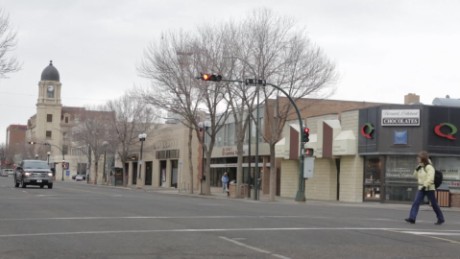
A different but safe land
On a bitterly cold and foggy afternoon in early January, Muna and Mohammed drove down Highway 5 to the Lethbridge airport. They waited for two brothers and their families to arrive from Lebanon. But they were not Muna’s loved ones.
Even before she met Ryan, Muna decided she would volunteer to translate for other arriving Syrian families who spoke little or no English. She felt it was her responsibility. There were so many Syrians who were in worse predicaments than her own family. Besides, she wanted to give back to Lethbridge, especially after private groups sponsored her family.
She felt grateful to Ryan and Erin Phillips, an Anglican pastor who spearheaded the groups sponsoring Muna’s family.
It was inconceivable to her that she, a Muslim woman, had befriended a man who was a Christian pastor. He was the first Canadian friend she made, the first she invited over to her house for dinner along with Erin and Ryan’s wife, Naomi.
She accompanied Ryan to the airport to welcome and translate for the Aljabers, the family from Homs.
Church members waited with toques and mittens in the compact arrivals hall for the Air Canada propeller plane from Calgary. Muna imagined it was her family climbing down the stairs on the tarmac and walking through the glass doors.
Soon, she thought. Inshallah. God willing.
It was heartening for Muna to see distressed compatriots arrive in the place she had made her home. She visited Lethbridge Immigrant Services, where the Syrian families received guidance on how to restart their lives. She knew it would be an uphill climb for many of them to stand on their own. Even with her English skills and a husband already established here, it had been hard for Muna. It would be that much harder for those who had no family in their new country.
But at least they were safe in Canada, Muna thought. She yearned for the same sanctuary for her family.
Tears, hugs and the maple leaf
The winds pick up even more as Muna drives back from Walmart to a rented suburban split-level house in West Lethbridge that will be her parents’ new home. Behind it is a housing complex where her brothers have each been given an apartment.
She learned just a week ago that Canadian officials had called her parents and brothers for interviews and health checks in Lebanon. Things move quickly after that. Erin, the Anglican pastor in charge of the private sponsor groups, told Muna her family could be on their way to Canada any day now.
“What about my sister?” Muna had asked Erin. “She didn’t get a call yet. I am very worried about her being alone.”
Muna knew there was little Erin could do to hasten the process for her sister. When you are a refugee, you have no say in when and how you travel. Muna’s family has learned patience in the most difficult of ways.
One night, Muna got so wound up that she sat alone in her pajamas in the living room. She didn’t even hear her son calling her to come lie down with him as she always did at bedtime.
She called her brother Abdul in the morning, and he complained about the enormous amount of paperwork.
“I will kill you if you lose any of those documents,” she said.
She had helped set up three households for her parents and brothers. The call had gone out for donations for refugees, and the list was long: Sofas. Beds. Dining tables. Kitchen appliances. Big pots. Shoe racks. Television sets. Soccer balls. Toys. Towels. Even decorative items such as flower vases and artwork to make the rooms feel cozy.
Muna helped assemble and arrange furniture and made bed after bed. In her parents’ bedroom, she and church volunteers unfolded purple and white embroidered sheets from Bed Bath Beyond. Muna joked her mother and father might have a second honeymoon here. It had been so long since they had a joyful night together.
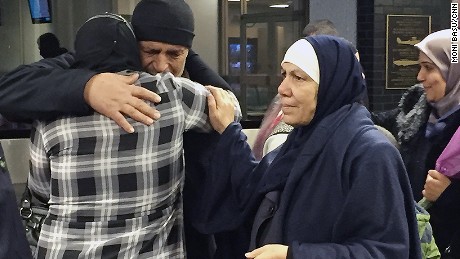
Now it’s nearly all done, she thinks as she sinks into an oversized couch, also a gift from a stranger.
“Thank God,” she says of her Arab friends who have volunteered to prepare platters of kibbe and grape-leaf dolmas for the big day. That makes cooking a special meal one less worry.
A few minutes later, Erin bursts through the door carrying locally roasted bags of coffee in one hand and ice skates in the other. “We’re going to turn these boys into Canadians yet,” she says about Muna’s nephews.
She flashes a smile the breadth of her entire face and announces Muna’s family will start arriving in two days. The scenes in Muna’s dreams are at long last unfolding.
On the first Sunday of February, Muna finds herself at the Lethbridge airport once again. This time, she is here for her own family.
“Finally,” she tells everyone gathered around her. She is laughing and crying at once. The anticipation is thick, as though a lifetime of separation is coming to an end. War has made six years feel that long.
Ryan and Erin are here along with several other sponsors. So are the al Jabber brothers and their mother. Muna was there for them, and they wanted to reciprocate.
Ryan looks at Mohammed, dressed in his just-out-of-the-packet Walmart shirt and prancing about the arrivals hall with balloons for his cousins. How different this feels than their first meeting a few months ago when Mohammed asked whether Ryan would help his family.
Ryan will never think of Syria the way he used to. It has now become a place where a friend is from.
Air Canada Flight 7215 lands just after 2:15 p.m., 15 minutes early.
“It’s happening,” Muna says, excited and quickly ending a call with a friend.
She presses her cheek against the glass door and strains to see the tarmac. Her brother Abdul and his family are the last to deplane. Muna can wait no longer. She rushes through the security door, unable to contain herself.
The guard doesn’t try to stop her. Everyone in the airport is watching. All have tears in their eyes.
The scene is repeated again several hours later, when Flight 7221 brings her parents and her other brother, Osama, to Lethbridge. Muna looks at the faces of her loved ones, every line deepened by war.
It’s a reunion made bittersweet by the absence of brothers and sisters spread across continents and the memories of a homeland they may never see again.
But in this moment, Muna is beaming. She holds onto her father and mother — and she does not let go.
In her youth, Muna didn’t take much notice of the maple leaf hoisted at the embassy near her house in Damascus. Now, she is thankful for Canada. On this day, it has given her the most precious gift of all.
Voices from the heartland: fear and hope in a city where Syrians settled
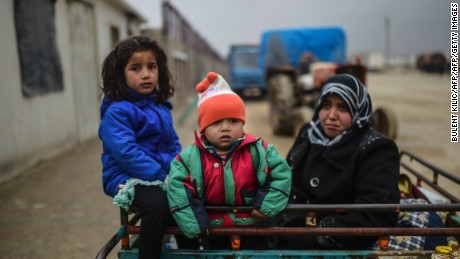
Leave a Reply